With a budget of $100,000, two young architects turned a 'murder shed' into a quirky tiny home in LA. Take a look inside.
Maria Noyen

- A derelict shed in Silver Lake, California, was renovated into a sleek, 350-square-foot tiny home.
- The architects behind the two-year transformation said it was once nicknamed "the murder shed."
This 350-square-foot tiny home in California wasn't always the dreamy hideaway it looks like today.
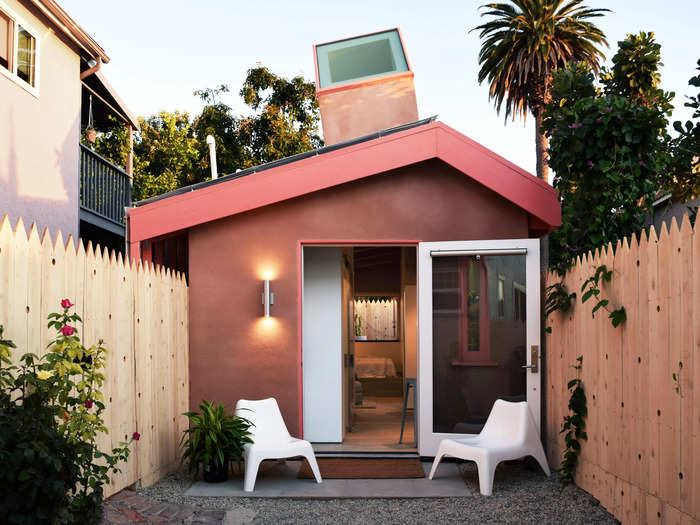
Architects Corie Saxman, 30, and Keith Marks, 33, told Insider they were hired to transform a derelict shed in Silver Lake, Los Angeles, into a modern accessory dwelling unit (ADU).
The duo said it all began in 2018 when one of the owners, Roger Merians, contacted them through Instagram.
Saxman and Marks – who met at graduate school and now run the architecture firm Ham Design Group – had never taken on a project alone, they said.
"Roger just cold messaged me," Marks said. "He said, 'Hey, I saw your thesis project. I love it. I got this tiny thing. I was wondering if you could do something for us, something exciting and not typical.'"
As thrilled as they were to land their first solo project, Marks and Saxman didn't love the original structure, which they nicknamed "the murder shed."
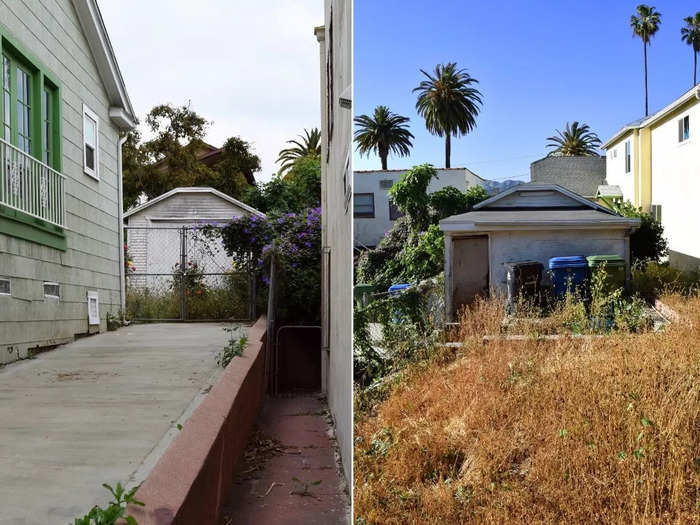
Seeing the shed — which lies on the same property as their client's home — for the first time wasn't exactly love at first sight for Marks or Saxman.
"We nicknamed it 'the murder shed' from day one," Marks said. "We definitely knew we had a lot of work ahead of us."
But any apprehension about the project they faced was eased by how lucky they said they were to have Merians and his husband Gregory Strait be their first clients.
"It was kind of the perfect relationship," Saxman said. "They were super open to all of our crazy ideas, and then they also interjected all of their crazy ideas."
Saxman said the shed was "falling apart" when she first saw it, but the structure did prove to be of some use during construction.
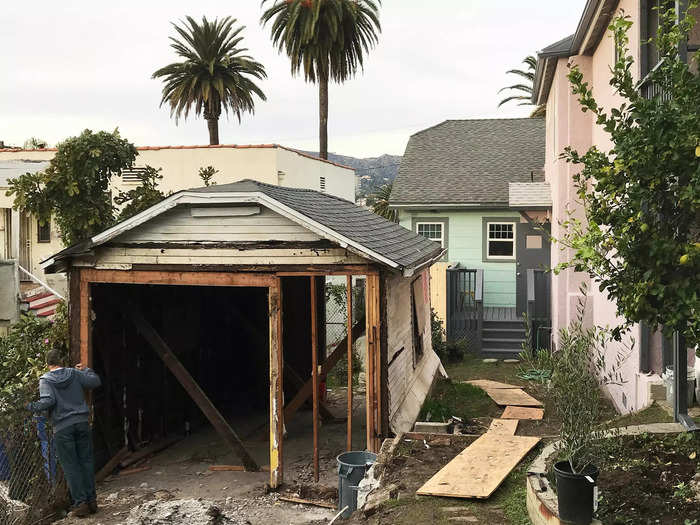
The benefit of starting a project with an existing structure, at least in Los Angeles, is that you have to deal with fewer setbacks, according to the architects.
"You get to maintain certain things," Marks said. "We wouldn't have been able to fit the ADU at the size or the massing we ended up with if we did not have the existing shed."
Despite all the changes made to the old "murder shed," the architects kept one of the existing walls running alongside the property, he said.
The architects said they approached the entire project backward, starting with color schemes.
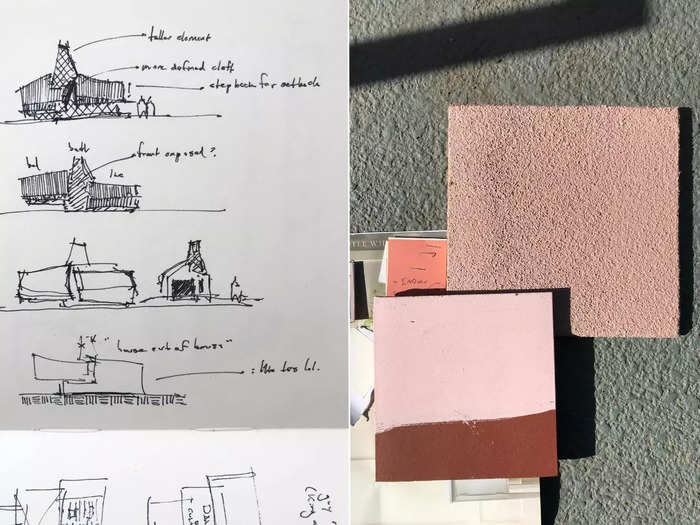
"Roger and Greg were so excited we kind of did it all backward," Marks said. Before anything was designed, the couple picked out the coral-pink color for the building.
It's not surprising then that flamingo lawn ornaments were a big inspiration for the design concept.
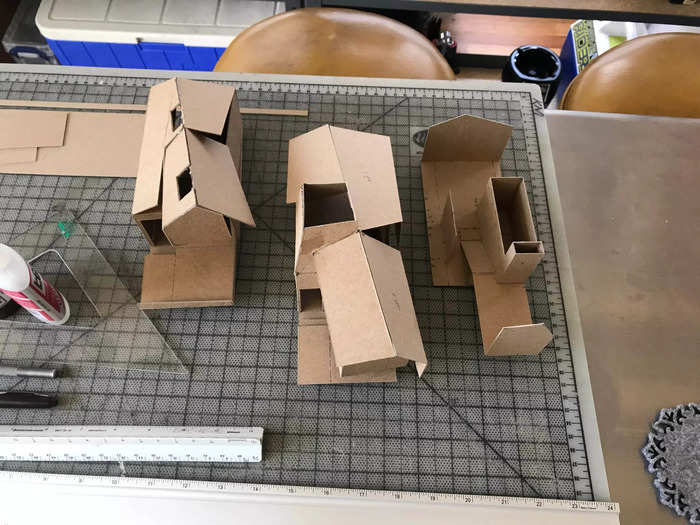
"We were always thinking of it kind of like a lawn ornament," Saxman said. "The flamingo kind of thing in the front yard."
Fitting with the rest of the neighborhood wasn't a priority they said. And according to Marks, that decision spoke to who the owners are as people.
"Greg and Roger, they're just really lovely, artful, eccentric people," he said.
It took two years to turn the shed into a sleek guest house, and the architects managed to keep the entire cost of the renovation within a budget of $100,000.
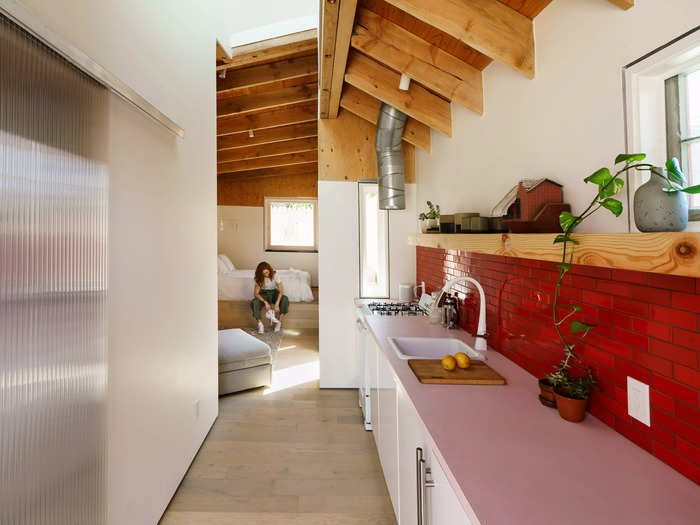
"The cost at the time was $100,000 all in," Marks said. He added that it was a tight budget for the square footage they were working with, but they managed to keep to it.
Luckily they started when they did because Marks said it would've been impossible to stick to that budget nowadays.
"You won't be able to replicate that post-pandemic," Marks said. "The market's totally wonky now."
Post-renovation, the guest house features a lofted bed positioned by a window ledge that Saxman says doubles as the perfect reading nook.
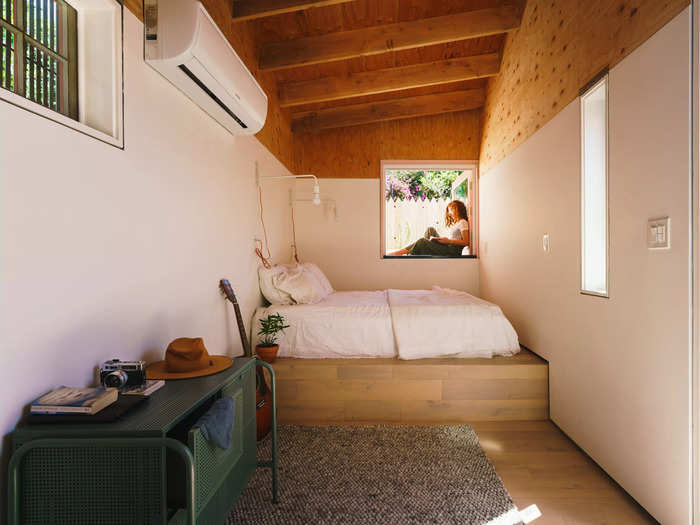
Regarding the actual living space, Saxman said the sitting and bedroom areas are accessible through the extended kitchen.
"It's a pretty small space," she said. "As you walk in, you have a small sitting area next to a closet, and then you have your bed platform right at the end."
Perhaps one of her favorite parts in the bedroom area is the window sitting ledge, which doubles as an access point to the tiny home's private outdoor space.
"You can basically crawl out of bed, sit in the window, read a book, and be in your backyard space," Saxman said.
To create space and light within the tiny home, the architects said they purposefully designed the structure to be tall and have sunshine streaming through windows.
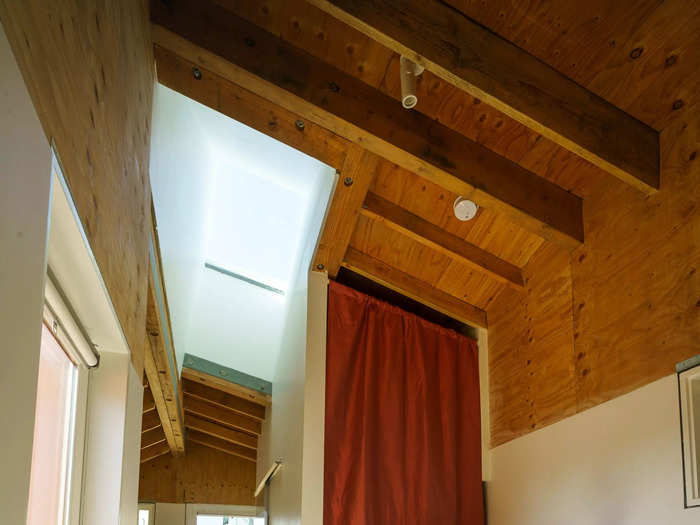
For what the home lacked in width, it made up for in height, according to Marks.
"The space is very tall. It actually gets up — in the skylight — to 20 feet," he said. "Our theory was that if you don't have the square footage to make it big, you go tall, and that compensates for the limited footprint."
Another way in which they made the house feel bigger and more open was by installing large windows throughout the space, Saxman said.
"In LA, it's so nice all the time," she said, "so having those open, you just feel like it's an extension of your living space."
Elsewhere in the home is a tropical-themed bathroom, separated from the rest of the space by a door made from translucent polycarbonate.
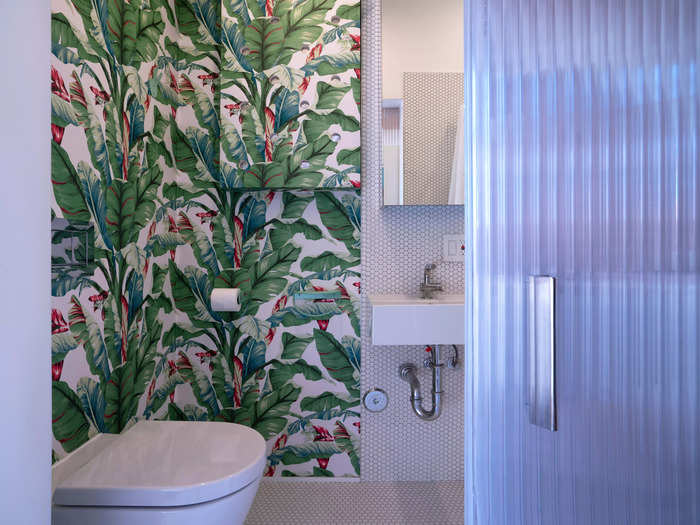
The bathroom door is built from polycarbonate, a sturdy but translucent material. The benefit of it being semi-transparent is that additional light from the bathroom window can stream into the home.
However, the architects said their clients were apprehensive about the material.
"They were concerned about feeling like you could see naked bodies behind it," Marks said.
He said they solved the issue by painting white strips at "crotch level" to avoid awkward situations.
Given it's a tiny home, the architects loved how quickly everything came together and how playful they could be with their design.
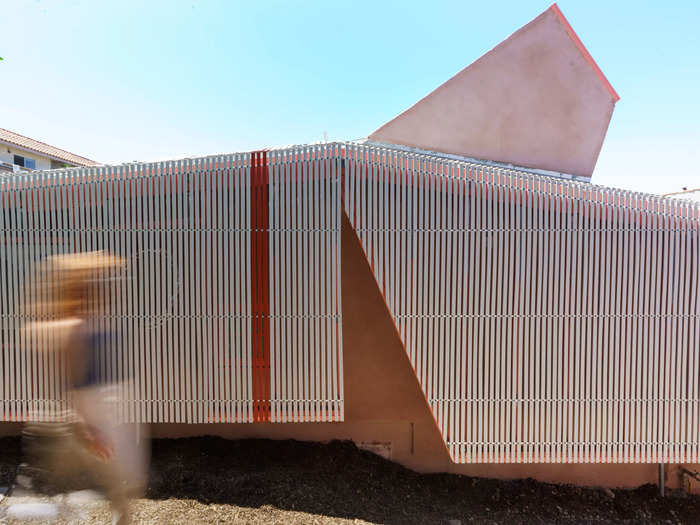
Saxman said having their first solo project as two young architects entering the field was a "fun experience" because it gave them the leeway to test out design concepts without significantly affecting the project timeframe.
Marks, who said he started out by designing larger buildings such as stadiums, said that another joy of designing a tiny home is how quickly everything can come together.
"It's like instant gratification," he said. "Stadium design, those take 10 years to finally see the fruition." Tiny homes, on the other hand, take two years tops, he said.
While Saxman and Marks said the 350-foot-square home could've been bigger, they were focused on quality, not quantity.
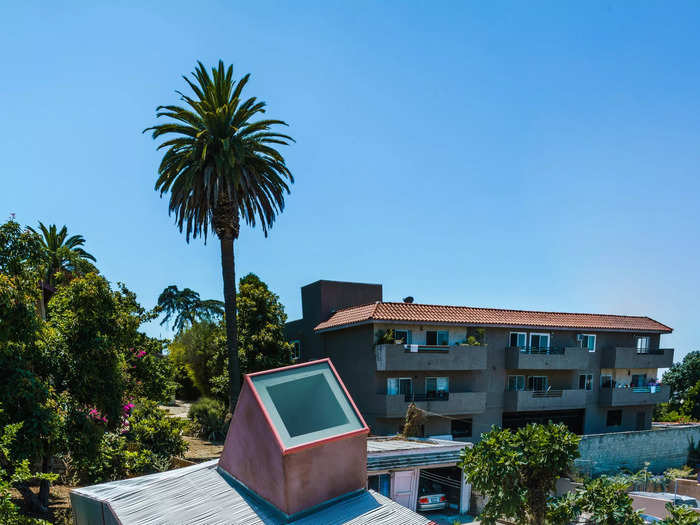
Marks said that people involved with renovations often try to max out on the square footage they have as a means to guarantee a return on investment.
But the way he and Saxman worked was different. Recalling how they explained it to the homeowners, Marks said, "it's not necessarily the size of the space, it's the quality of the space."
In the end, they said they could convince the couple that 350 square feet was more than enough space for their dream guest house, which in turn helped everyone stick to the agreed-upon $100,000 budget.
The guest house has been "booked solid" since it's been on Airbnb, which Marks said is evidence that it's suitable for long-term living.
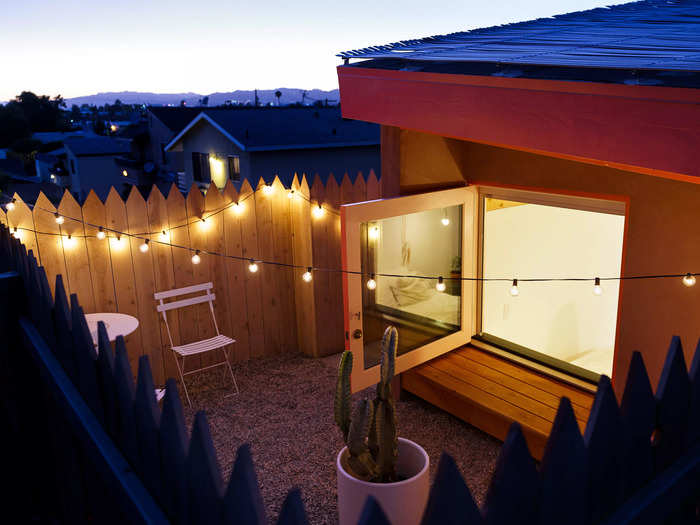
The tiny home is available to book for long-term stays on Airbnb, but anyone interested in paying a visit may have to wait a while, according to Marks.
"It's been booked solid since it's been on Airbnb," he said, adding that it goes to show that even though it's a tiny home, it's perfectly equipped to be a permanent home.
"If you have just the right shaping of that space and the right quality of light and air, people can inhabit one of these long-term," Marks said.
In the end, Saxman and Marks said the homeowners achieved their goal of standing out in the neighborhood as people often stop by to stare at it.
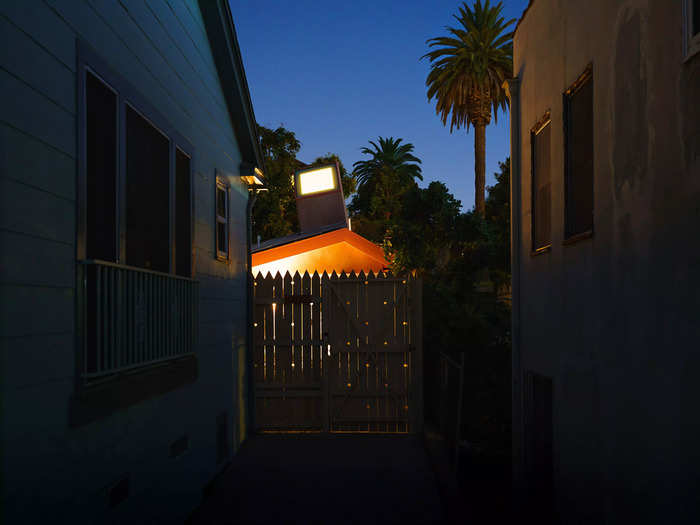
"You get a lot of looks," Saxman said. The neighborhood the guest house is in is very "typical LA," she added, which makes it stand out all the more.
During the renovation process, they said strangers passing by were fascinated with the funky structure, which was unlike anything else surrounding it.
"Everybody would kind of stop and poke their heads in," she said. "It's just this quirky thing tucked behind a fence on a property."
From a derelict shed to a popular Airbnb, it seems the homeowners, with the help of Saxman and Marks, accomplished what they set out to do: stand out.
Popular Right Now
Popular Keywords
Advertisement